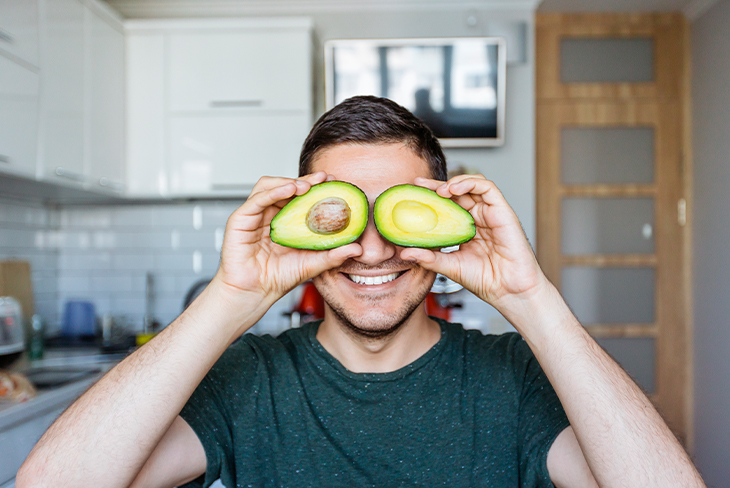Unlocking the good mood, good food connection

We eat when we’re happy, when we're blue and even when we’re not hungry. Here’s how to eat food that boosts your mood, the healthy way.
Hunger is only one of many reasons we reach for food. Different moods – anxiety, depression and stress – see some people making poor food choices, and this pattern of eating to lift a current mood is referred to as ‘comfort eating’ or ‘emotional eating’.
Registered dietitian Solandi van Zyl has worked for Life Healthcare for five years and currently practises at Life St George’s Hospital in Port Elizabeth. She describes emotional eating as a cycle that can be characterised by feeling an uncomfortable emotion, for example, stress, and a craving to find a way back to feeling comfortable.
How can I lift my mood naturally?
Food and mood are fundamentally linked, explains Solandi.
‘Stress, anxiety, depression or other uncomfortable feelings lead to a behaviour pattern of eating to numb those feelings. A person experiences temporary relief, followed by feelings of guilt and shame,’ says Solandi.
‘The negative thoughts, emotions and regrets cause the cycle of emotional eating to repeat. The trick is to break the cycle while you are in the middle of it and to create new habits and links in the brain.’
‘There are psychological strategies that can be used to break the cycle, including distracting yourself with a hobby or another enjoyable activity, and keeping a food diary,’ says registered dietitian Lila Bruk.
‘Documenting what you eat as well as how you are feeling at the time is useful to identify your triggers and what corrective measures to put in place,’ agrees Solandi.
How can I eat to feel good?
‘There are several reasons for emotional eating, including an imbalance in brain chemicals, stress and nutrient deficiencies,’ says Lila.
An imbalance in brain chemicals, such as a low level of the neurotransmitter serotonin, is more likely to lead to emotional eating. ‘Choose mood-boosting foods that contain serotonin, such as oats, leafy vegetables and grains,’ adds Lila.
Low levels of dopamine – the brain chemical linked to the body’s reward system – can also increase emotional eating. ‘Boost dopamine levels by eating more dairy and foods that are high in protein,’ says Lila.
Mood-boosting foods
Foods that reduce anxiety
‘If you’re feeling anxious, try to eat foods rich in vitamin C, which have been found to reduce the production of the stress hormone cortisol,’ says Lila. These foods include guavas, strawberries, citrus fruits and tomatoes. Other foods that reduce anxiety are wholegrains such as seed bread, brown rice and oats.
Foods that relieve stress and depression
‘If you’re feeling stressed, try to eat eggs regularly. They are an excellent source of B-vitamins, which assist with stress relief,’ says Lila.
‘During extended periods of stress, your body releases more of the hormone cortisol and levels will stay elevated, which can lead to anxiety, depression and weight gain,’ says Solandi. ‘To maintain healthy cortisol levels, aim for regular exercise and foods high in omega-3 fatty acids and magnesium, like fatty fish (salmon or mackerel), nuts, avocado and banana.’
Foods to eat if you feel agitated
‘If you’re feeling troubled or nervous, eat foods rich in omega-3s, folic acid, vitamin B₁₂ and vitamin D,’ recommends Lila.
Omega-3s have a mood-boosting effect, folic acid and vitamin B₁₂ are both important for serotonin production, and vitamin D boosts serotonin levels. You’ll find these mood boosters in fatty fish, walnuts, flaxseed, legumes, wholegrains, sunflower seeds, shellfish, fish, beef and dairy products. Safely catch some gentle rays from the sun for your daily vitamin D boost, which also helps to create a happy mood.
You can naturally boost your mood by eating a balanced diet. Download a list to put up on your fridge so you know what foods to buy on your next visit to the shops. If you need professional help, consult a dietitian for advice on what would work best for you.
The content provided is not intended to be a substitute for professional medical advice, diagnosis or treatment and does not cover every aspect of mental health. Consult a doctor or your nearest emergency unit if you are concerned about your own or a loved one’s mental health. The information is shared on condition that readers will make their own determination, including seeking advice from a qualified healthcare professional. E&OE. Life Healthcare Group Ltd does not accept any responsibility for any loss or damage suffered by the reader as a result of the information provided.

